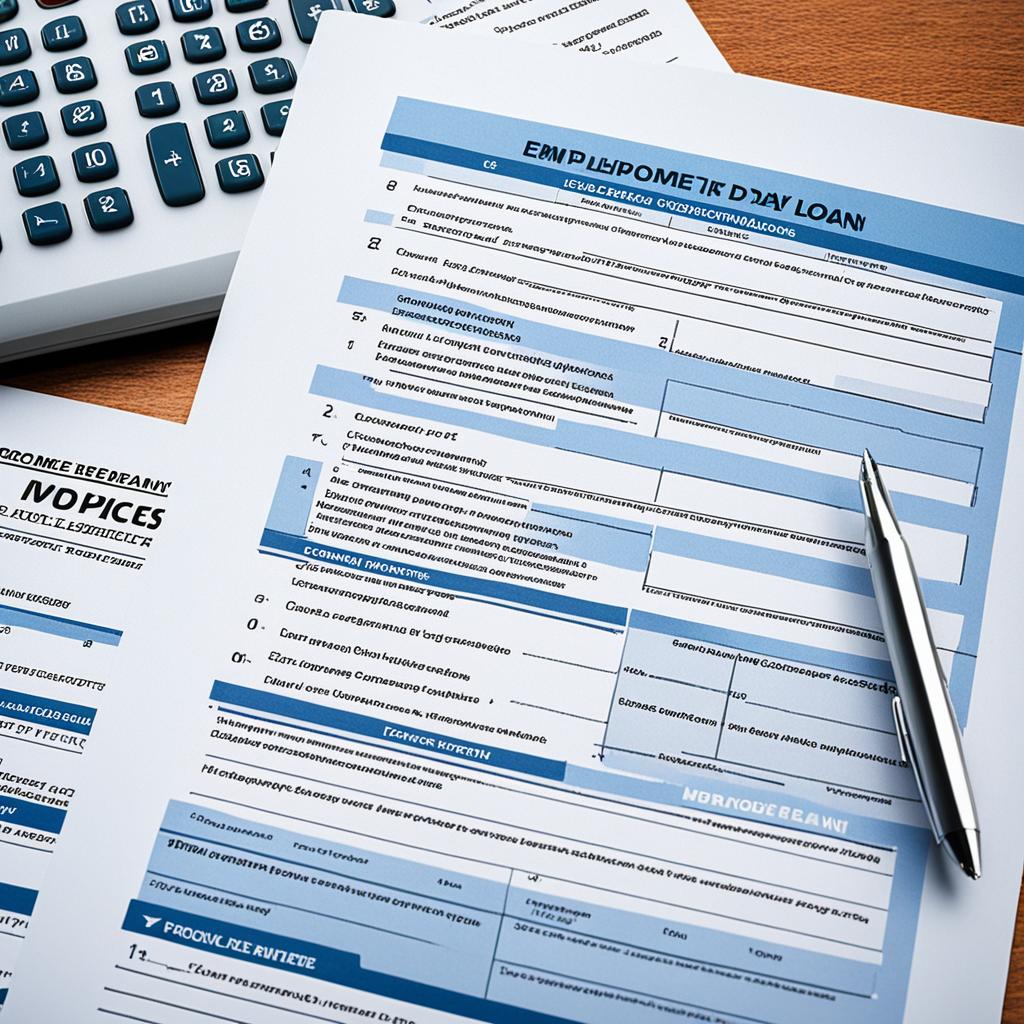In today’s fast-paced world, unexpected expenses can arise at any moment. From medical emergencies to car repairs, these financial challenges can quickly derail our plans and send us into a panic. That’s where emergency same day loans come in. They promise quick cash to help you cover those unplanned costs and get your life back on track. But are they really as helpful as they seem, or do they have hidden dangers? Let’s delve into the world of emergency same day loans and explore the benefits and risks they bring.
Key Takeaways:
- Emergency same day loans provide quick access to funds for unexpected expenses.
- Online lenders offer convenient application processes and fast funding times.
- Quick emergency loans can be used for home repairs, travel expenses, medical emergencies, and more.
- Consider the pros and cons before opting for emergency loans online.
- Personal loans offer a safer alternative to risky same-day loans.
What Are Emergency Loans?
Emergency loans are a financial lifeline designed to assist borrowers facing unexpected expenses that they cannot afford to pay immediately out of pocket. These loans provide quick access to funds, helping individuals navigate financial hardships and urgent situations. Emergency loans can be a valuable tool in times of crisis, providing a much-needed safety net for those facing unforeseen circumstances.
There are various types of emergency loans available, each with its own eligibility criteria and repayment terms. The specific loan amount and interest rates may vary depending on factors such as the borrower’s credit score, income, and state regulations. Whether it’s a medical emergency, car repair, or an unforeseen home expense, emergency loans can provide the necessary financial support to address these pressing needs.
Obtaining an emergency loan is typically a straightforward process that can be completed online or at a local financial institution. Many lenders offer quick approval and funding, ensuring borrowers receive the necessary funds in a timely manner. These loans can be secured or unsecured, depending on the lender and the borrower’s creditworthiness.
It’s important to note that while emergency loans can be a lifeline during challenging times, borrowers should carefully consider their financial situation and their ability to repay the loan. Additionally, comparing loan options from different lenders is crucial to ensure favorable terms and conditions.
Types of Emergency Loans:
- Personal Loans
- Payday Loans
- Installment Loans
- Car Title Loans
- Lines of Credit
- Short-term Loans
- Student Loans
Each type of emergency loan has its own characteristics and requirements, catering to diverse financial needs. Borrowers should carefully assess their situation and choose the loan that aligns best with their specific circumstances.
How Do Online Emergency Loans Work?
When you’re facing a financial emergency and need quick cash, online emergency loans can come to your rescue. These loans offer a convenient and hassle-free solution, as the entire application and funding process is conducted digitally.
With online emergency loans, you can complete the entire loan application process from the comfort of your own home, using your computer or smartphone. This eliminates the need to visit a physical bank or lender, saving you time and effort.
Most online emergency loans are unsecured personal loans, meaning you do not need to provide collateral to secure the loan. This makes the process even simpler and faster, as you won’t have to go through the process of valuing and pledging assets.
Online lenders offer a variety of loan options tailored to meet different financial needs. Whether you require a small loan to cover a minor expense or a larger loan to address a significant financial setback, you can find suitable loan options online.
Additionally, some online lenders provide prequalification options. This means you can check your eligibility for a loan before formally applying. By providing basic information such as your income, employment, and credit score, you can get an initial assessment of whether you qualify for the loan.
Once you submit your loan application online, the lender will review your information and assess your creditworthiness. If approved, you will receive the funds directly into your bank account, usually within a short time frame.
When it comes to repaying the loan, online lenders typically offer flexible options. You can set up automatic payments or make manual payments according to the agreed-upon terms. This enables you to manage your repayments conveniently and stay on track with your financial obligations.
Online emergency loans provide a seamless and efficient way to access much-needed funds during times of financial urgency. The process is straightforward, fast, and secure, allowing you to address your financial needs without unnecessary delays or complications.
| Advantages of Online Emergency Loans | Disadvantages of Online Emergency Loans |
|---|---|
|
|
Expert Quote:
“Online emergency loans provide a convenient and accessible solution for individuals in need of quick cash. However, borrowers should exercise caution and carefully consider the terms and conditions of the loan before proceeding.” – Financial Specialist
What Can You Do With Quick Emergency Loans?
Quick emergency loans are a versatile financial tool that can help you navigate unexpected expenses in times of crisis. Whether it’s a sudden home repair, car breakdown, travel expense, or medical emergency, these loans provide the swift funds you need to address urgent financial needs.
Emergency situations can be stressful, but having access to quick emergency loans can alleviate some of the financial burdens and enable you to focus on resolving the immediate issue at hand.
Examples of Expenses Covered by Quick Emergency Loans:
- Home Repairs: From leaky pipes to broken appliances, emergency loans can provide the funds to fix your home quickly and avoid further damage.
- Car Repairs: Unexpected car troubles can disrupt your daily routine. Quick emergency loans can cover the cost of repairs and get you back on the road.
- Travel Expenses: If you need to make an emergency trip, such as an unexpected family event or medical appointment, emergency loans can help cover the travel costs.
- Medical Emergencies: Health issues can arise at any time. Quick emergency loans can assist with medical bills, prescription costs, or unexpected hospital visits.
With quick emergency loans, you have the flexibility to decide how to allocate the funds and address your immediate financial needs. However, it’s crucial to remember that these loans typically come with interest and fees, so it’s essential to borrow responsibly and only take what you truly need.
Quick emergency loans provide the financial support I needed when my car broke down unexpectedly. Thanks to the loan, I was able to get my car repaired quickly and get back to my daily routine. It was a lifesaver in a stressful situation. – Sarah
Remember to explore all available options and compare loan terms from different lenders to ensure you secure the best possible loan terms to fit your financial situation.
| Benefits of Quick Emergency Loans | Considerations for Quick Emergency Loans |
|---|---|
|
|
Ultimately, quick emergency loans can be a valuable resource during unexpected financial emergencies, providing immediate relief and allowing you to regain control of your situation. However, it is essential to borrow responsibly, considering the interest rates, fees, and your ability to repay the loan within the specified terms.
Next, we will explore the different types of emergency loans available online and the pros and cons associated with each.
Pros & Cons of Emergency Loans Online
When it comes to emergency loans, the online option has gained popularity due to its convenience and accessibility. However, like any financial product, there are pros and cons to consider before making a decision. Let’s take a closer look at the advantages and disadvantages of emergency loans online.
Advantages of Emergency Loans Online
- Flexibility: Emergency loans online offer flexibility in terms of loan amounts and repayment options. Borrowers can choose the loan amount that best meets their needs and select a repayment plan that fits within their budget.
- Accessibility: Online lenders provide easy access to emergency loans 24/7, allowing borrowers to apply for a loan at their convenience without the need to visit a physical location.
- Quick Application Process: Applying for emergency loans online is simple and time-efficient. Borrowers can complete the application form online, submit required documents electronically, and receive loan approval and funding within a short period.
Disadvantages of Emergency Loans Online
- Stricter Loan Requirements: Online lenders may have stricter eligibility criteria than traditional lenders. Borrowers may need to have a higher credit score, provide proof of income, and meet other stringent requirements to qualify for an emergency loan.
- Higher Interest Rates: Due to the convenience and quick access to funds, emergency loans online often come with higher interest rates compared to traditional loans. Borrowers should carefully consider the cost of borrowing and determine if they can afford the higher interest payments.
- Smaller Loan Amounts: Online emergency loans typically offer smaller loan amounts compared to other types of loans. This may limit the borrowing capacity for individuals with larger financial needs.
Overall, emergency loans online can be a valuable financial tool in times of need, providing quick access to funds with minimal hassle. However, borrowers should carefully weigh the advantages and disadvantages before making a decision. It’s essential to consider individual financial circumstances, repayment capabilities, and alternative borrowing options to make an informed choice.
“Emergency loans online offer flexibility and convenience, allowing borrowers to access funds quickly. However, borrowers should be aware of the potential drawbacks, such as stricter requirements and higher interest rates.”
| Advantages of Emergency Loans Online | Disadvantages of Emergency Loans Online |
|---|---|
| Flexibility in loan amounts and repayment options | Stricter loan requirements |
| Accessible 24/7, without the need for physical visits | Higher interest rates |
| Quick and easy online application process | Smaller loan amounts |
What Are the Different Types of Online Emergency Loans?
When it comes to online emergency loans, borrowers have a range of options to choose from. Each type of loan has its own unique characteristics and requirements. Let’s explore the different types of online emergency loans available:
1. Personal Loans
Personal loans are one of the most common types of online emergency loans. These loans are typically unsecured, meaning you don’t need to provide collateral. They can be used for various purposes and offer flexible repayment terms.
2. Payday Loans
Payday loans are short-term loans that are intended to be repaid on your next payday. These loans usually have high interest rates and are designed for individuals who need immediate cash. However, they can be quite costly, and borrowers should carefully consider the terms and fees before taking out a payday loan.
3. Installment Loans
Installment loans are loans that are repaid over time in fixed, regular installments. These loans often have lower interest rates compared to payday loans, making them a more affordable option for many borrowers.
4. Title Loans
Title loans are secured loans that require borrowers to use their vehicle’s title as collateral. These loans typically have high interest rates and short repayment terms. If the borrower fails to repay the loan, the lender may repossess the vehicle.
5. Lines of Credit
A line of credit is a flexible borrowing option that allows you to access funds up to a predetermined credit limit. You can withdraw funds as needed and only pay interest on the amount borrowed. Lines of credit can be a convenient solution for ongoing or recurring expenses.
6. Short-Term Loans
Short-term loans are small-dollar loans that are typically repaid within a short period, usually within a few weeks or months. These loans may have higher interest rates, so it’s important to carefully assess your ability to repay before taking out a short-term loan.
7. Student Loans
Student loans are specifically designed to help students finance their education expenses. These loans often have favorable interest rates and flexible repayment terms. However, keep in mind that student loans are typically intended for educational purposes only.
It’s essential to carefully evaluate the terms and conditions of each type of online emergency loan, considering factors such as interest rates, repayment terms, and any potential associated fees. Understanding your financial needs and capabilities will help you choose the right loan option that best suits your situation.
| Loan Type | Interest Rates | Collateral Requirement | Repayment Terms |
|---|---|---|---|
| Personal Loans | Varies; typically lower | No | Flexible |
| Payday Loans | High | No | Single repayment on next payday |
| Installment Loans | Varies; typically lower | No | Fixed installments |
| Title Loans | High | Yes (Vehicle title) | Short repayment term |
| Lines of Credit | Varies | No | Revolving credit |
| Short-Term Loans | Varies; may be high | No | Short repayment term |
| Student Loans | Varies; typically lower | No | Flexible |
How to Choose an Emergency Loan?
When faced with urgent financial needs, choosing the right emergency loan is crucial. To ensure you make an informed decision, consider the following factors:
- Funding Time: Evaluate how quickly you need the funds. Some lenders offer same-day or next-day funding, while others may take longer.
- Interest Rates: Compare the interest rates offered by different lenders. Lower interest rates can significantly reduce the total repayment amount.
- Lender’s Fees: Take into account any fees or charges associated with the loan. These can include application fees, origination fees, prepayment penalties, or late payment fees.
- Repayment Terms: Review the repayment terms offered by each lender. Look for flexible options that fit your budget, such as longer repayment periods or the ability to make early payments without penalties.
- Customer Reviews: Research the lender’s reputation and read customer reviews. This will give you insights into their customer service, transparency, and overall borrowing experience.
By carefully considering these factors, you can choose an emergency loan that aligns with your financial needs and provides the most favorable terms. Remember to compare multiple loan options and thoroughly understand the terms and conditions before making a final decision.
“Taking the time to evaluate different emergency loan options can help you secure the best financing solution for your situation. Don’t rush the decision and make sure to read the fine print before signing any loan agreements.”
What State Regulations Are in Place for Payday Loans?
When considering payday loans as an emergency loan option, it is crucial to understand that these loans are subject to specific regulations that vary from state to state. Each state has its own set of rules and restrictions regarding payday lending practices to protect consumers from potential exploitation. Familiarizing yourself with the state regulations for payday loans can help you make informed decisions when applying for such a loan.
Some states have completely prohibited payday loans due to their high interest rates and predatory nature. These states prioritize consumer welfare and aim to prevent borrowers from falling into cycles of debt. However, in states where payday loans are allowed, there are generally regulations in place to ensure fairness and protect borrowers.
Common State Regulations for Payday Loans
While regulations may vary, here are some common aspects regulated by state governments:
- Loan limits: States often impose maximum loan amounts that lenders can provide to borrowers. This helps prevent borrowers from taking on more debt than they can handle.
- Loan fees and interest rates: States may set limits on the fees and interest rates that lenders can charge on payday loans. This helps protect borrowers from excessive charges and unfair interest rates.
- Repayment terms: States may require payday lenders to provide borrowers with reasonable repayment terms, allowing them adequate time to repay their loans without facing unnecessary financial strain.
- Borrower eligibility: States may have specific eligibility criteria that borrowers must meet to qualify for payday loans. These criteria often include age restrictions and proof of income.
It is important to note that state regulations for payday loans can change over time. Therefore, it is advisable to stay up to date with the latest regulations in your state before considering a payday loan.
“Understanding the state regulations for payday loans is crucial in making informed financial decisions. By being aware of the loan limits, fees, interest rates, and repayment terms set by your state, you can ensure that you are making a responsible borrowing choice.”
As seen in the table above, payday loan regulations vary significantly across different states. Some states have implemented strict regulations to protect consumers, while others have fewer restrictions in place. By understanding the payday loan regulations in your state, you can make informed decisions and choose the best course of action for your financial needs.
How Do Same-Day Loans Work?
Same-day loans are a convenient borrowing option that provides quick access to funds on the same day of application. These loans are available from various lenders, including car-title lenders, payday lenders, and pawnshops. However, it’s important to understand the potential drawbacks of same-day loans, such as high interest rates and fees, which make them a less favorable choice for borrowers.
When faced with a financial emergency, same-day loans can seem like a lifesaver. They offer the convenience of fast funding, making them an attractive option for individuals in urgent need of cash. However, it’s crucial to carefully evaluate the terms and conditions of same-day loans before committing to them.
Same-day loans typically come with higher interest rates and fees compared to traditional loans. Lenders may charge additional fees for processing the loan quickly and providing immediate access to funds. These fees can add to the overall cost of borrowing, making same-day loans a more expensive option in the long run.
Furthermore, same-day loans often require borrowers to provide collateral or have a good credit score, making them less accessible to individuals with poor credit or limited assets. This means that borrowers who opt for same-day loans might have limited options and may be vulnerable to predatory lending practices.
“While same-day loans can provide quick cash, borrowers need to carefully consider the high interest rates and fees associated with these loans.”
To make an informed decision, borrowers should explore alternative options, such as personal loans from reputable lenders. Personal loans often have lower interest rates, longer repayment periods, and more reasonable fees, making them a safer choice for borrowers.
It’s crucial to assess your financial situation and evaluate the potential risks and benefits before applying for a same-day loan. Consider factors such as the loan amount, interest rates, repayment terms, and the lender’s reputation. Taking the time to compare different loan options can help you make a more informed and responsible borrowing decision.
Different Types of Same-Day Loans and How They Work
When it comes to same-day loans, borrowers have a few different options to consider. Let’s take a closer look at each type and how they work:
1. Payday Loans
Payday loans are short-term loans typically offered for small amounts of money. These loans are meant to be repaid quickly, usually on the borrower’s next payday. Payday loans often come with high interest rates, making them an expensive borrowing option.
2. Title Loans
Title loans involve using a borrower’s car as collateral for the loan. The lender holds the title to the vehicle until the loan is repaid. If the borrower fails to repay the loan, the lender may repossess their car. Title loans are typically short-term and come with high interest rates.
3. Pawn Shop Loans
Pawn shop loans require borrowers to provide an item of value, such as jewelry or electronics, as collateral for the loan. The pawn shop holds onto the item until the loan is repaid. If the borrower fails to repay the loan, the pawn shop may sell the item to recover their funds. Pawn shop loans often have high interest rates and short repayment periods.
4. Credit Card Cash Advances
Credit card cash advances allow borrowers to withdraw cash against their credit card’s line of credit. The borrower can use their credit card at an ATM or request a cash advance through their credit card company. Cash advances usually come with high interest rates and may have additional fees.
Now that you know the different types of same-day loans available, it’s important to carefully consider the costs and risks associated with each option. Remember to compare interest rates, terms, and repayment requirements before making a decision.

Personal Loans: A Safer ‘Same-Day Loan’ Option
When it comes to meeting urgent financial needs, personal loans offer a safer alternative to risky same-day loans. While personal loans may not provide same-day funding, they come with several advantages that make them a more responsible borrowing choice. Let’s explore why personal loans are a better option when you need quick access to funds.
The Benefits of Personal Loans
Personal loans offer several key benefits that differentiate them from same-day loans:
- Lower Interest Rates: Personal loans typically come with lower interest rates compared to same-day loans. This means you’ll pay less in interest charges over the life of the loan.
- Longer Repayment Periods: With personal loans, you have the flexibility of longer repayment periods. This allows you to spread out the loan payments over a more manageable timeframe, reducing the financial strain.
- Fewer Fees: Personal loans often have fewer fees compared to same-day loans. This means you’ll save money on application fees, origination fees, and other related charges.
By choosing a personal loan instead of a same-day loan, you can enjoy these benefits and have more control over your financial situation.
“Personal loans offer lower interest rates, longer repayment periods, and fewer fees compared to same-day loans. This makes them a more responsible borrowing choice.”
Comparison Table: Personal Loans vs. Same-Day Loans
| Features | Personal Loans | Same-Day Loans |
|---|---|---|
| Interest Rates | Lower | Higher |
| Repayment Periods | Longer | Shorter |
| Fees | Fewer | More |
As shown in the comparison table above, personal loans offer more favorable terms and conditions compared to same-day loans. This makes them a safer and more affordable option for borrowers in need of quick funds.
When considering your borrowing options, keep in mind that while personal loans may not provide immediate funding, they offer long-term benefits and greater financial stability. Choose the option that aligns with your needs and allows you to borrow responsibly.
How to Choose a Same-Day Loan Lender
When it comes to choosing a same-day loan lender, there are several factors that borrowers should consider to ensure they make the best decision for their financial situation.
1. Budget
Before selecting a lender, take the time to assess your budget and determine how much you can comfortably afford to borrow. It’s essential to choose a same-day loan lender that offers loan amounts and repayment terms that align with your financial capabilities. Borrowing more than you can afford can lead to financial strain and make it challenging to repay the loan on time.
2. Application Requirements
Each same-day loan lender may have different application requirements. Some lenders may require a higher credit score or income level than others. It’s crucial to review the lender’s eligibility criteria before applying to ensure that you meet their requirements. This will increase the chances of your application being approved, saving you time and effort.
3. Track Record and Reputation
Reputation matters when it comes to choosing a same-day loan lender. Research the lender’s track record and read customer reviews or testimonials to gain insight into their reputation. A reputable lender will have positive feedback from satisfied customers and a transparent lending process. Avoid lenders with a history of complaints or predatory lending practices.
4. Interest Rates
Interest rates play a significant role in the overall cost of a same-day loan. Compare interest rates offered by different lenders and choose one that offers reasonable rates. Be wary of lenders who charge excessively high-interest rates, as they can quickly escalate the total repayment amount.
5. Transparency
Transparency is key when selecting a same-day loan lender. Ensure that the lender provides clear and concise information regarding fees, repayment terms, and any potential penalties or charges. Avoid lenders who are vague or evasive about the terms and conditions of the loan. Clear communication and transparency help borrowers make informed decisions and avoid hidden surprises down the line.
“Choosing a reputable same-day loan lender is crucial to avoid falling into a debt trap. Consider factors such as your budget, the lender’s requirements, track record, and interest rates before making a decision.”
Same-Day Loan Lender Comparison
| Lender | Interest Rate | Loan Amount | Repayment Term | Application Requirements |
|---|---|---|---|---|
| Lender A | 10% | $1,000 – $5,000 | 6 – 12 months | Minimum credit score of 600, proof of income |
| Lender B | 15% | $500 – $2,000 | 3 – 6 months | No minimum credit score, steady employment |
| Lender C | 20% | $1,000 – $10,000 | 12 – 24 months | Minimum credit score of 550, proof of income |
Compare different same-day loan lenders based on their interest rates, loan amounts, repayment terms, and application requirements. Use the table above as a starting point to assess and evaluate your options, ensuring you find a lender that meets your needs.
By considering your budget, reviewing application requirements, assessing a lender’s reputation, comparing interest rates, and prioritizing transparency, you can make an informed decision when choosing a same-day loan lender. Taking the time to research and select the right lender can help you avoid potential pitfalls and ensure a positive borrowing experience.
What Do I Need to Apply for a Same-Day Loan?
To apply for a same-day loan, there are several requirements that borrowers typically need to meet. These requirements may vary slightly depending on the lender and the type of loan being applied for. However, the following criteria are commonly requested:
- Age: Applicants must be at least 18 years old to be eligible for a same-day loan.
- Active Checking Account: Having an active checking account is usually a requirement, as it allows for easy funds transfer and repayment.
- Proof of Income: Lenders often require borrowers to provide proof of income, such as pay stubs, bank statements, or tax returns, to ensure that they have a consistent source of funds to repay the loan.
- Valid ID: A valid government-issued ID, such as a driver’s license or passport, is typically required to verify the borrower’s identity.
These requirements ensure that borrowers have the means to repay the loan and help lenders assess the borrower’s creditworthiness. It’s important to note that additional documentation or criteria may be required depending on the specific lender and loan type.
By meeting these requirements, borrowers increase their chances of being approved for a same-day loan and receiving the funds they need quickly.
What Are the Requirements for Same-Day Loans?
When applying for same-day loans, it’s important to meet certain requirements set by the lenders. While the specific criteria may vary between lenders, there are some common requirements that borrowers need to fulfill:
- Age: You must be at least 18 years old to apply for a same-day loan.
- Active Checking Account: Lenders typically require borrowers to have an active checking account. This is where the loan funds will be deposited and where the repayment will be withdrawn from.
- Proof of Income: Lenders need to verify that you have a steady source of income to ensure that you can repay the loan. This can be in the form of pay stubs, bank statements, or other relevant documents.
- Valid ID: You will need to provide a valid identification document, such as a driver’s license or passport, as proof of your identity.
In addition to these basic requirements, lenders may also consider factors such as your credit history and debt-to-income ratio when evaluating your loan application. It’s important to note that different lenders may have additional specific requirements, so it’s worth checking with them directly.
Quote:
“Meeting the requirements for same-day loans ensures that you have a better chance of getting approved and receiving the funds you need quickly.”
Comparison of Common Requirements for Same-Day Loans
| Lender | Age Requirement | Checking Account | Proof of Income | Valid ID |
|---|---|---|---|---|
| Lender A | 18+ | Required | Yes | Yes |
| Lender B | 21+ | Required | Yes | Yes |
| Lender C | 18+ | Required | Yes | Yes |

Where Can I Get a Same-Day Loan?
If you’re in need of a same-day loan, there are several options available to you. However, it’s important to approach these options with caution, as they often come with high interest rates and fees. Consider the following lenders when looking for a same-day loan with more favorable terms:
1. Reputable Online Lenders
Online lenders can provide a convenient and reliable source for same-day loans. They offer a quick and streamlined application process, allowing you to apply for a loan from the comfort of your own home. Additionally, online lenders often have competitive interest rates and transparent terms, making them a safer choice for borrowers.
2. Credit Unions
Credit unions are not-for-profit financial institutions that often offer more affordable loan options compared to traditional banks. They prioritize their members’ needs and strive to provide competitive rates and flexible repayment terms. Consider joining a credit union and exploring their same-day loan options.
3. Personal Loan Providers
Personal loan providers, such as established banks and lending companies, can be a reliable source for same-day loans. These loans typically come with lower interest rates and longer repayment periods compared to riskier loan options like payday loans. Take the time to research and compare different personal loan providers to find the most suitable option for your needs.
“When looking for a same-day loan, it’s essential to consider lenders with a trustworthy reputation and transparent terms.”
Remember, while same-day loans can be a helpful resource in times of financial need, it’s crucial to carefully review the terms and conditions of any loan before making a decision. Assess your financial situation and borrow responsibly to avoid falling into a debt trap.
| Lender | Interest Rates | Loan Amounts | Repayment Terms |
|---|---|---|---|
| Reputable Online Lenders | Varies; competitive rates available | $1,000 – $50,000 | Up to 5 years |
| Credit Unions | Often lower rates compared to traditional banks | Varies; range depends on credit union | Flexible repayment options |
| Personal Loan Providers | Varies; based on creditworthiness | $1,000 – $50,000 | Repayment terms range from 1 to 7 years |
Table: Comparison of Same-Day Loan Providers
By exploring these alternative options, you can find a same-day loan that suits your needs while minimizing the risks associated with high interest rates and fees.
Conclusion
When facing a financial emergency, emergency same-day loans can offer a lifeline by providing quick access to funds. However, it is crucial for borrowers to thoroughly assess the benefits and risks associated with these loans before making a decision.
Consider exploring personal loans offered by reputable lenders as a safer and more affordable alternative to risky same-day loans. Personal loans generally offer lower interest rates, longer repayment periods, and fewer fees compared to same-day loan options.
Before applying for any loan, it is essential to evaluate your financial situation and carefully choose a loan that aligns with your needs and repayment capabilities. Remember, responsible borrowing is key to maintaining financial stability.
FAQ
Are emergency same day loans a good solution for unexpected expenses?
What are emergency loans?
How do online emergency loans work?
What can you do with quick emergency loans?
What are the pros and cons of emergency loans online?
What are the different types of online emergency loans?
How do I choose an emergency loan?
What state regulations are in place for payday loans?
How do same-day loans work?
What are the different types of same-day loans and how do they work?
Are personal loans a safer ‘same-day loan’ option?
How do I choose a same-day loan lender?
What do I need to apply for a same-day loan?
What are the requirements for same-day loans?
Where can I get a same-day loan?
Conclusion
Source Links
- https://nypost.com/personal-loans/same-day-loans/
- https://www.creditkarma.com/personal-loans/i/payday-loans
- https://www.cash1loans.com/blog-news/emergency-payday-loans
Money posts:
 Car Title Loans Online: Fast Cash or Fast Trouble? (2024)
Car Title Loans Online: Fast Cash or Fast Trouble? (2024)
 Secured Loan with a Financed Car: How-To Guide (2024)
Secured Loan with a Financed Car: How-To Guide (2024)
 What Is Direct Lending? A Beginner’s Guide
What Is Direct Lending? A Beginner’s Guide
 Buy a House with No Money Down: Is It Possible? The dream of homeownership is within reach, even if you don’t have a substantial down payment. As a first-time home buyer, you may be wondering: Can you buy a house with no money down? The answer is yes! There are options available that can help you achieve your goal of owning a home without a large upfront payment. Key Takeaways: It is possible to buy a house with no money down, especially as a first-time home buyer. Specific first-time home buyer loans and assistance programs offer the opportunity to purchase a home with zero down payment. Government grants and loans are available to offset the initial costs of homeownership, such as closing costs. As a first-time homebuyer, you can take advantage of first-time homebuyer loans that require no down payment. These loans, such as the FHA loan and Conventional 97, allow for as little as 3% down. Additionally, there are government grants and loans available that can further offset the upfront costs of purchasing a home. While conventional and FHA loans typically require a minimum 3% to 3.5% down payment, exceptional options exist for certain groups. Veterans and rural homebuyers with moderate to low incomes may qualify for zero down payment loans. These programs open the door to homeownership without the need for a substantial upfront payment. Low down payment options are also available for first-time homebuyers. FHA loans, for instance, require a down payment as low as 3.5%, making homeownership more attainable for individuals with limited funds. Additionally, there are various low-income homebuyer programs at both the state and federal levels that offer grants or low-interest loans to cover down payments and closing costs. Government-backed loans, such as VA loans and USDA loans, are zero-down mortgages that make it possible for buyers with limited financial flexibility to purchase a home without a large upfront down payment. VA loans cater to military veterans and offer benefits like no down payment and no mortgage insurance. USDA loans promote homeownership in rural and certain suburban areas, also with no down payment required. If you’re wondering how to cover the down payment, there are options available. Down payment assistance programs offer grants or low-interest loans to help cover down payments and closing costs. Another option is receiving a down payment gift from a family member, which can help reduce the upfront expenses. It’s important to note that lenders often require a gift letter stating that the money is a gift and not a loan. In conclusion, buying a house with no money down is possible through various first-time homebuyer loans and assistance programs. These options eliminate the need for a traditional down payment, making homeownership more accessible for individuals with limited upfront funds. Whether you qualify for a zero-down payment loan, a low-down-payment option, or assistance programs, it’s important to explore all available options and work with a trusted lender or home lending expert to find the best mortgage solution for your unique situation and goals.
Buy a House with No Money Down: Is It Possible? The dream of homeownership is within reach, even if you don’t have a substantial down payment. As a first-time home buyer, you may be wondering: Can you buy a house with no money down? The answer is yes! There are options available that can help you achieve your goal of owning a home without a large upfront payment. Key Takeaways: It is possible to buy a house with no money down, especially as a first-time home buyer. Specific first-time home buyer loans and assistance programs offer the opportunity to purchase a home with zero down payment. Government grants and loans are available to offset the initial costs of homeownership, such as closing costs. As a first-time homebuyer, you can take advantage of first-time homebuyer loans that require no down payment. These loans, such as the FHA loan and Conventional 97, allow for as little as 3% down. Additionally, there are government grants and loans available that can further offset the upfront costs of purchasing a home. While conventional and FHA loans typically require a minimum 3% to 3.5% down payment, exceptional options exist for certain groups. Veterans and rural homebuyers with moderate to low incomes may qualify for zero down payment loans. These programs open the door to homeownership without the need for a substantial upfront payment. Low down payment options are also available for first-time homebuyers. FHA loans, for instance, require a down payment as low as 3.5%, making homeownership more attainable for individuals with limited funds. Additionally, there are various low-income homebuyer programs at both the state and federal levels that offer grants or low-interest loans to cover down payments and closing costs. Government-backed loans, such as VA loans and USDA loans, are zero-down mortgages that make it possible for buyers with limited financial flexibility to purchase a home without a large upfront down payment. VA loans cater to military veterans and offer benefits like no down payment and no mortgage insurance. USDA loans promote homeownership in rural and certain suburban areas, also with no down payment required. If you’re wondering how to cover the down payment, there are options available. Down payment assistance programs offer grants or low-interest loans to help cover down payments and closing costs. Another option is receiving a down payment gift from a family member, which can help reduce the upfront expenses. It’s important to note that lenders often require a gift letter stating that the money is a gift and not a loan. In conclusion, buying a house with no money down is possible through various first-time homebuyer loans and assistance programs. These options eliminate the need for a traditional down payment, making homeownership more accessible for individuals with limited upfront funds. Whether you qualify for a zero-down payment loan, a low-down-payment option, or assistance programs, it’s important to explore all available options and work with a trusted lender or home lending expert to find the best mortgage solution for your unique situation and goals.
 Apply for Car Loan: Easy Steps to Your Dream Car (2024)
Apply for Car Loan: Easy Steps to Your Dream Car (2024)
 Best Debt Consolidation Loans: Clear Debt Faster (2024)
Best Debt Consolidation Loans: Clear Debt Faster (2024)
 Best Egg Loan: Cracking The Code to Easy Loans (2024)
Best Egg Loan: Cracking The Code to Easy Loans (2024)
 Allocated Waiver Mortgage: Simplify Your Home Loan (2024)
Allocated Waiver Mortgage: Simplify Your Home Loan (2024)

